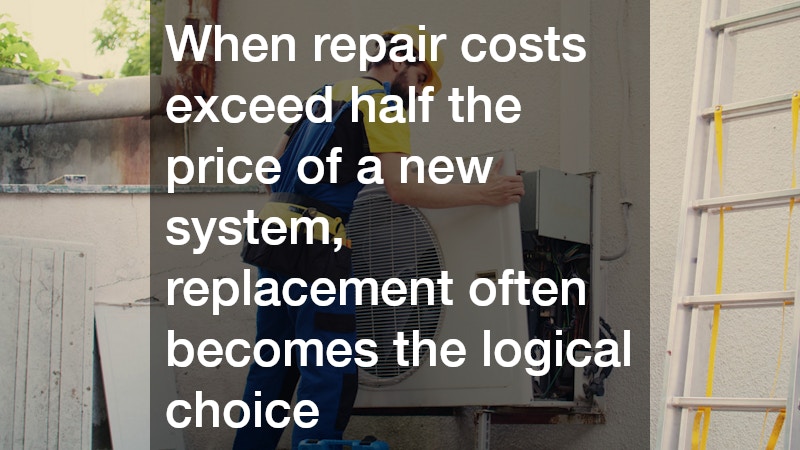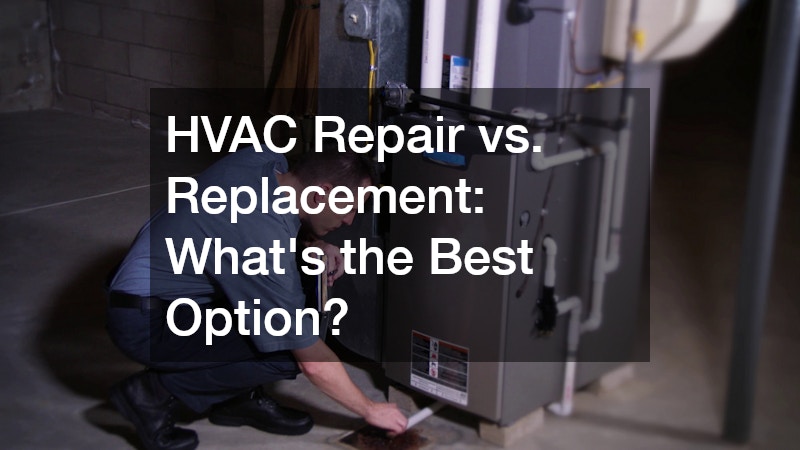When faced with a faltering HVAC system, deciding between repair and replacement can be challenging. Each option has its own set of benefits and costs, both short-term and long-term. In this comprehensive guide, we’ll explore the factors influencing your decision, provide insights into when repair is a viable solution, and discuss scenarios where replacement might be the better choice.
Understanding When to Opt for HVAC Repair
Deciding on HVAC repair largely depends on the age and condition of your system. A relatively new system with malfunctioning parts may benefit from targeted repairs to extend its life.
Repair can be a cost-effective solution if the issues are minor and the system was well-maintained over the years. It’s essential to consult with a professional to assess the likelihood of future repairs, ensuring that you don’t end up spending more money over time than a replacement would cost.
Another consideration is the frequency of repairs. If your HVAC system is frequently breaking down, leading to rising repair bills, it may be time to consider replacement. However, if repairs are infrequent and do not disrupt your comfort too often, fixing the system might be the better option. It’s crucial to weigh the costs against the potential benefits each time you opt for HVAC repair.
Environmental considerations also play a role in the repair versus replacement decision. If your HVAC system is not energy efficient or uses outdated technology, it might be increasing your carbon footprint. Occasionally, a simple repair might suffice to improve efficiency, but in other cases, replacement with a more modern, environmentally friendly system could be the superior option. Making your home greener and potentially reducing your energy bills are key factors to ponder.
Signs That Indicate it’s Time for HVAC Replacement
There are clear indicators that it is time to consider an HVAC replacement over continued repairs. One primary sign is the age of the system; generally, HVAC systems have a lifespan of about 10 to 15 years. If your system is approaching or surpassing this age range, efficiency likely will have diminished, and repairs might become more frequent and costly. Continuously investing in an aging system can be financially draining and inefficient.
Performance issues that persist even after several repair attempts highlight the need for replacement. If the HVAC system struggles to maintain a consistent temperature or fails to keep certain areas of your home comfortable despite multiple repairs, it may be failing irreversibly. Persistent problems despite repairs usually signal that replacing the unit is a more viable long-term solution. Additionally, recurring breakdowns during peak seasons signify that your system cannot keep up with demand.
The cost involved in repeated HVAC repairs compared to a one-time replacement is another factor. When repair costs exceed half the price of a new system, replacement often becomes the logical choice. Though the upfront cost of a new HVAC system might be daunting, the long-term financial benefits, including lower energy bills and potentially reduced maintenance, often make this option more appealing. An energy-efficient system can also qualify for tax incentives, making replacement financially attractive.
Weighing the Costs and Benefits of Repair vs. Replacement
When faced with deciding between HVAC repair and replacement, the initial cost can heavily influence a homeowner’s choice. Repairs generally have lower upfront costs, making them immediately more appealing. However, repeated repairs can accumulate significant expenses, gradually overshadowing the cost benefits they initially presented. In contrast, despite their higher initial cost, replacements provide a one-time financial hit followed by long-term savings from improved efficiency and reduced maintenance needs.
A critical aspect to consider is energy efficiency. Older systems tend to consume more energy, leading to higher utility bills. Newer, modern HVAC systems boast enhanced energy efficiency, translating into lower monthly bills and reduced environmental impact. An investment in replacement for efficiency gains not only benefits your wallet but the planet too, creating a win-win scenario in the long run.
Advancements in HVAC technology mean that new systems come equipped with features enhancing comfort and control. Smart thermostats and zoning capabilities provide flexibility and precision in managing the indoor environment. Deciding on HVAC repair or replacement is a journey through cost-analysis, efficiency considerations, and the pursuit of improved comfort. Each path has its merits, but evaluating the unique needs of your home and system will guide you to the best decision.
Deciding between HVAC repair and replacement involves assessing various factors, each specific to your situation. Evaluate the age, efficiency, and repair history of your current system when faced with this crucial decision. Consulting with an HVAC professional can provide unique insights tailored to your system, ensuring you make the most informed decision possible. Remember, both pathways offer unique benefits; understanding your individual priorities will ultimately steer you toward the best resolution.



